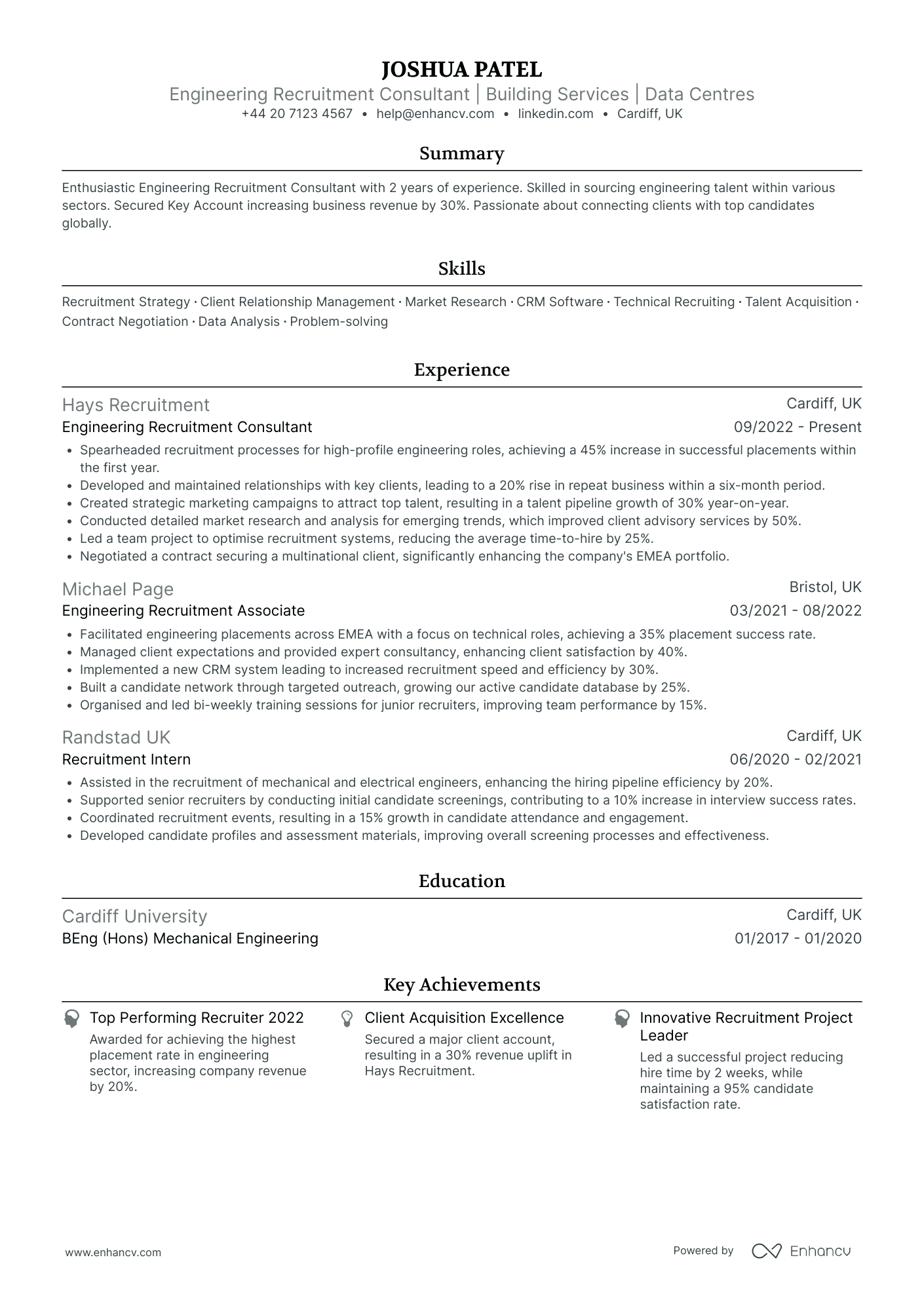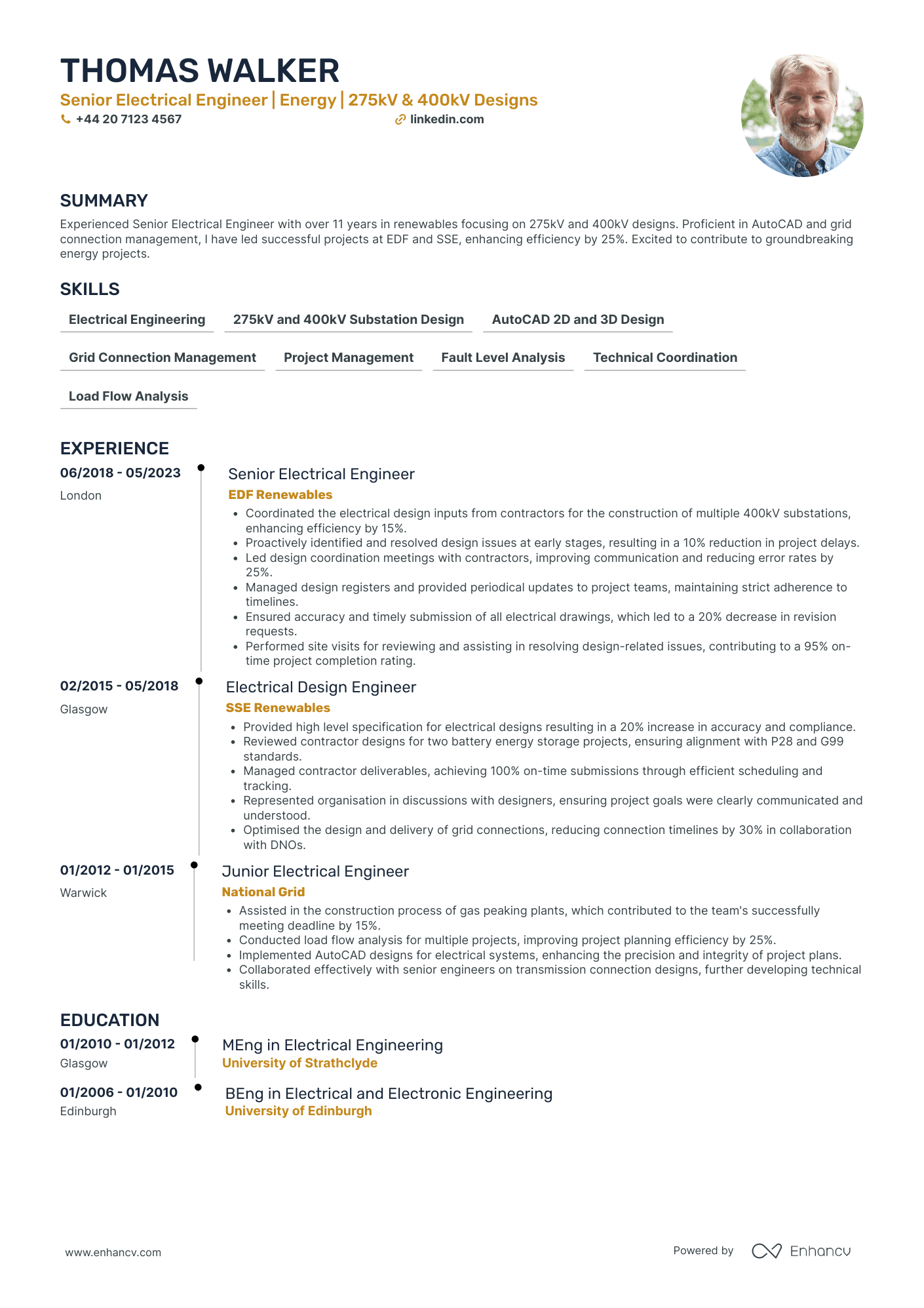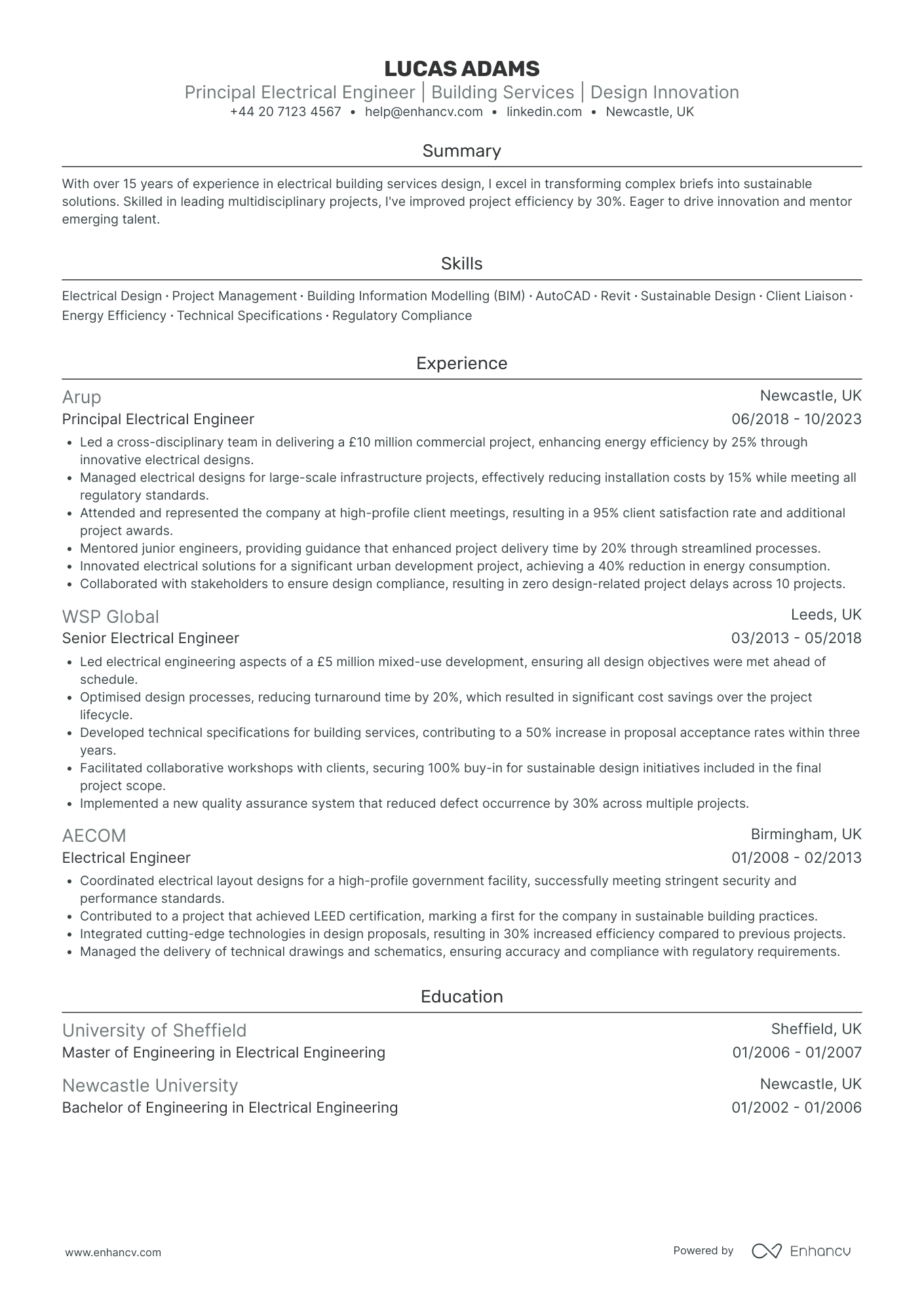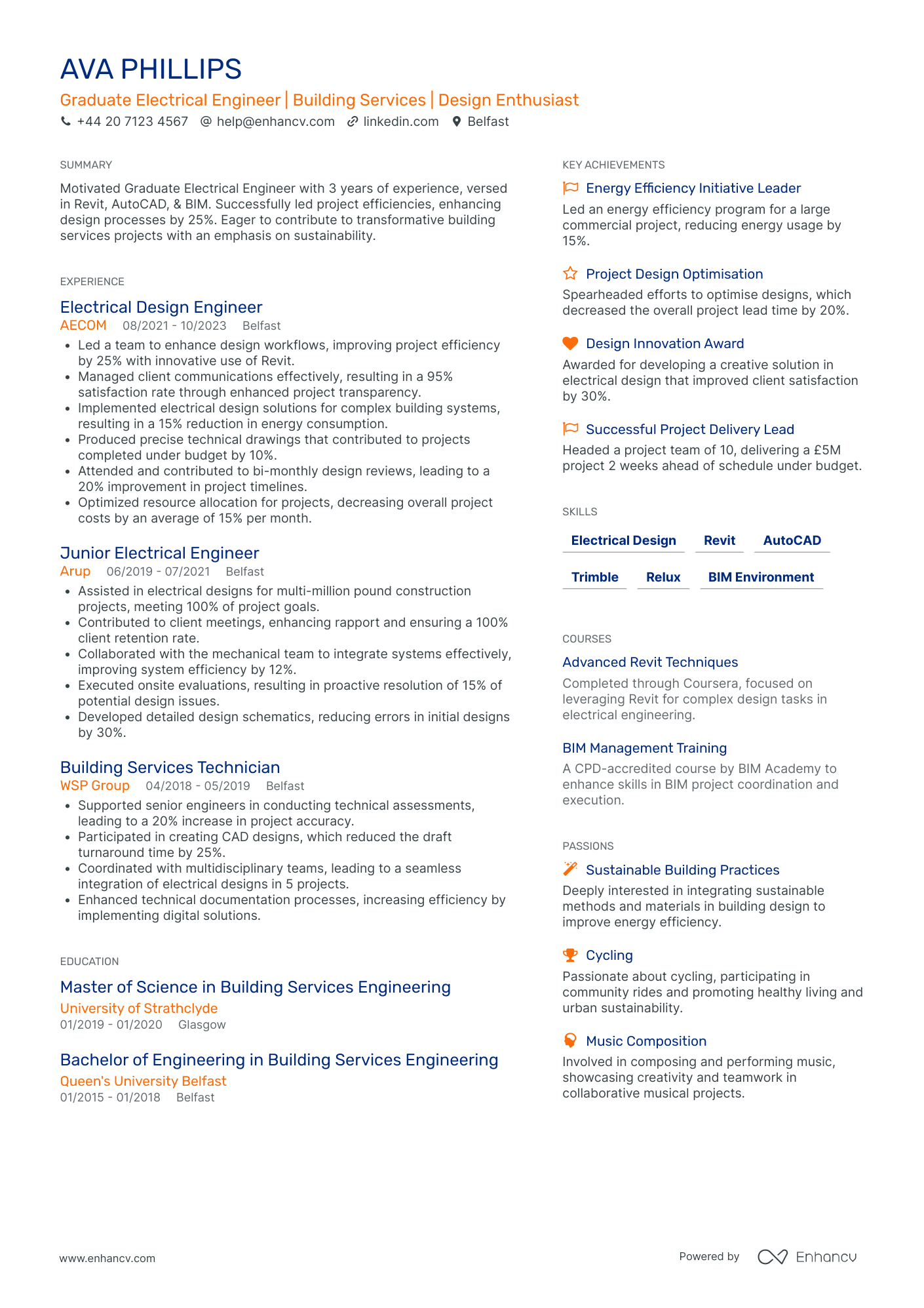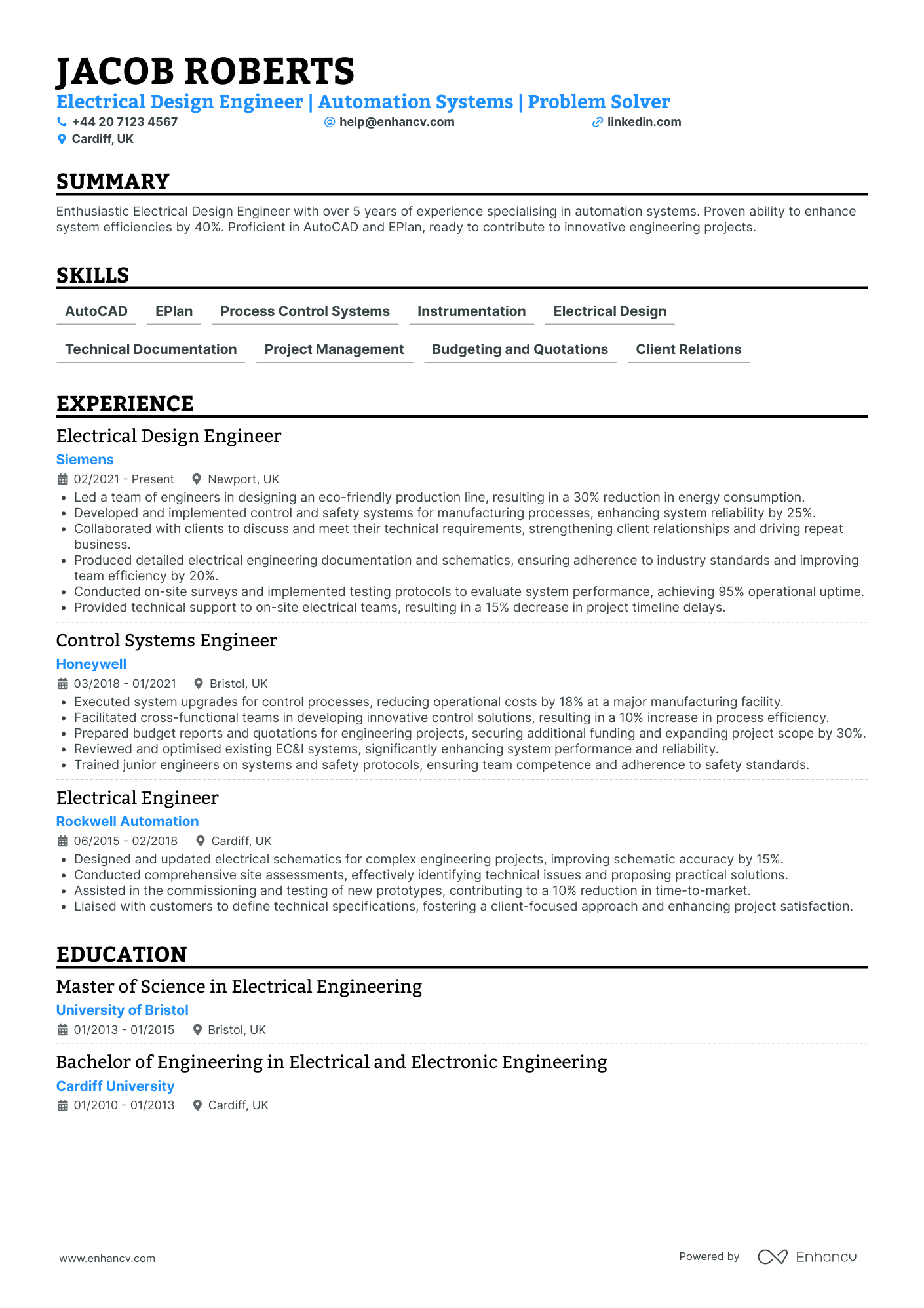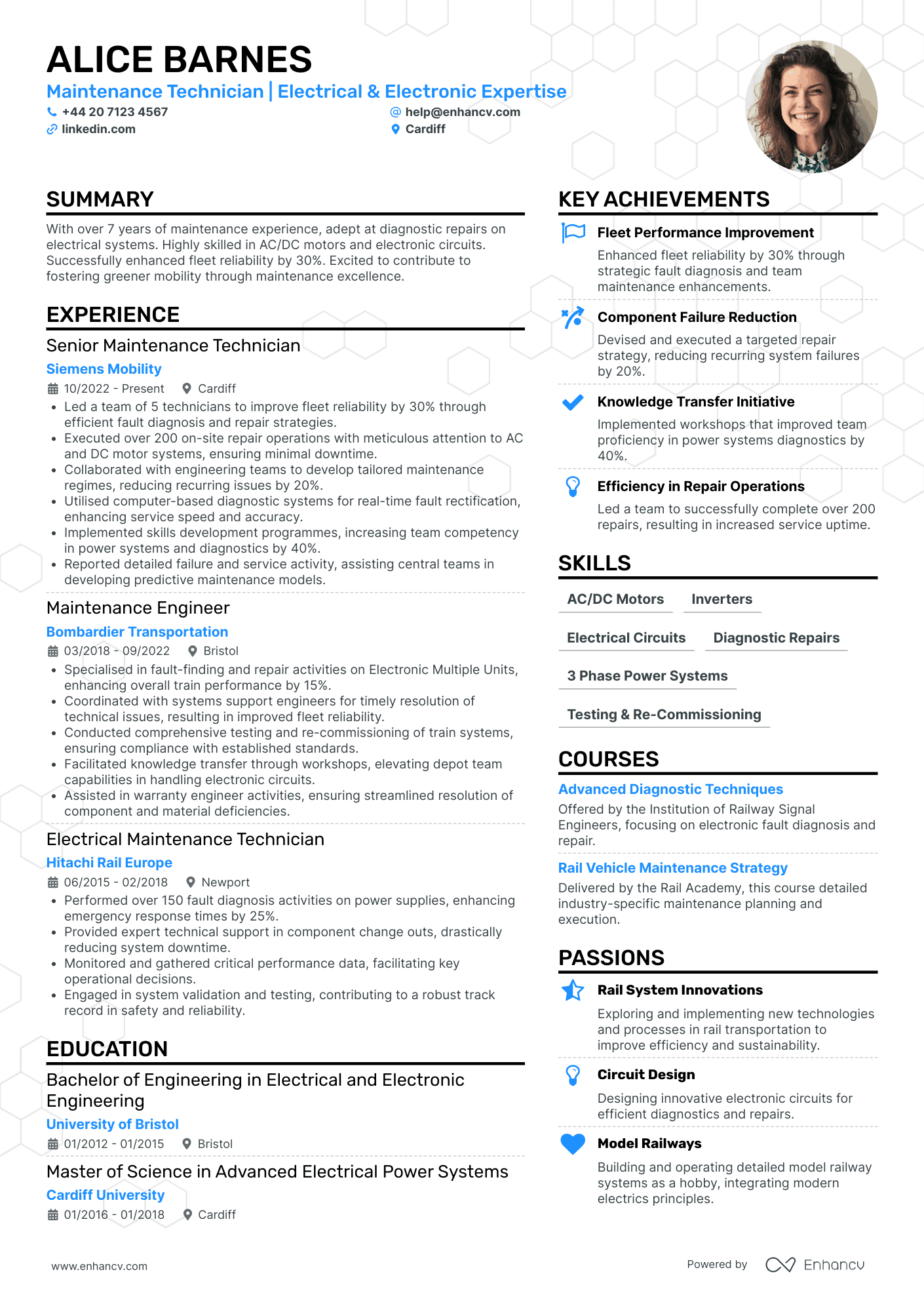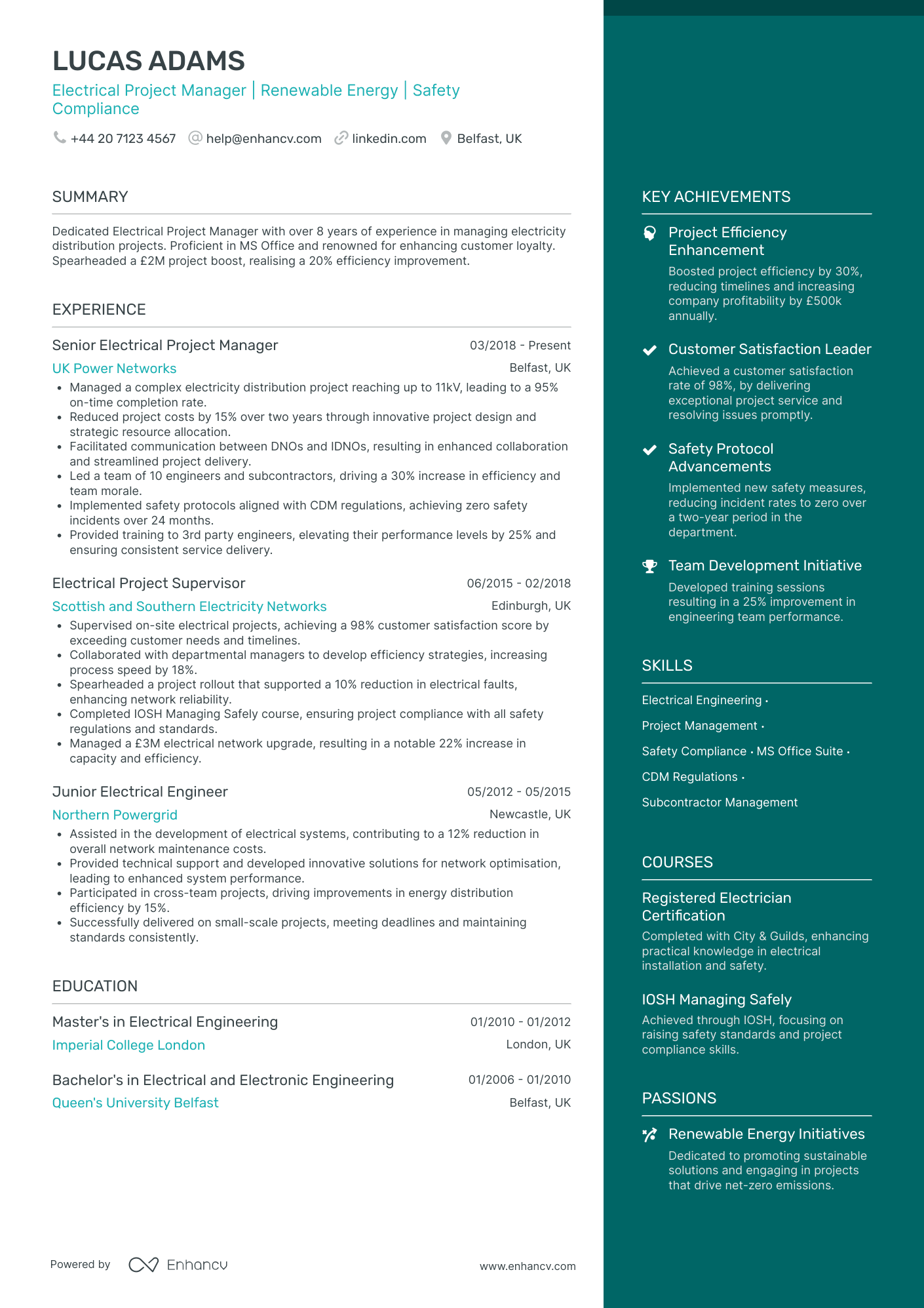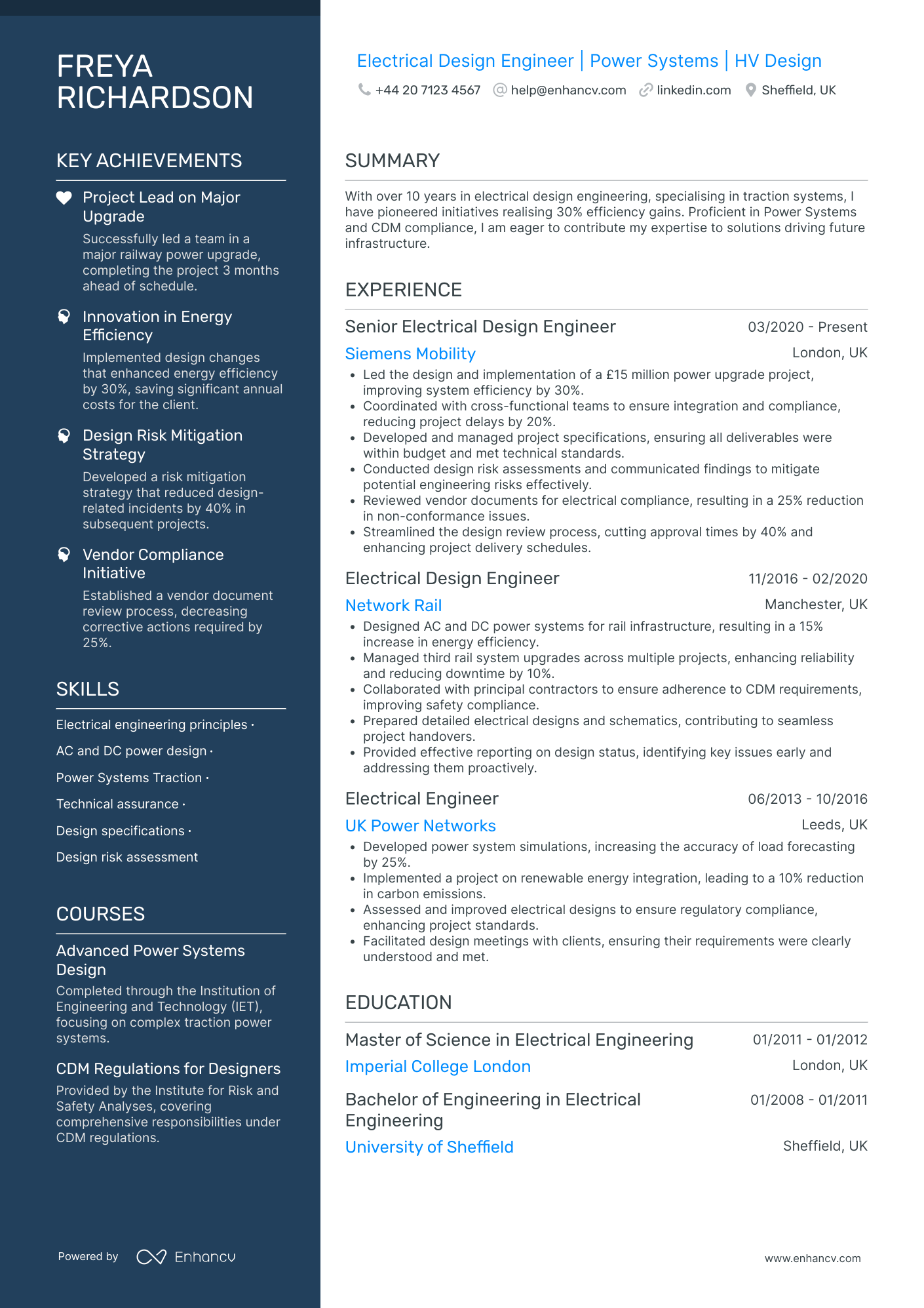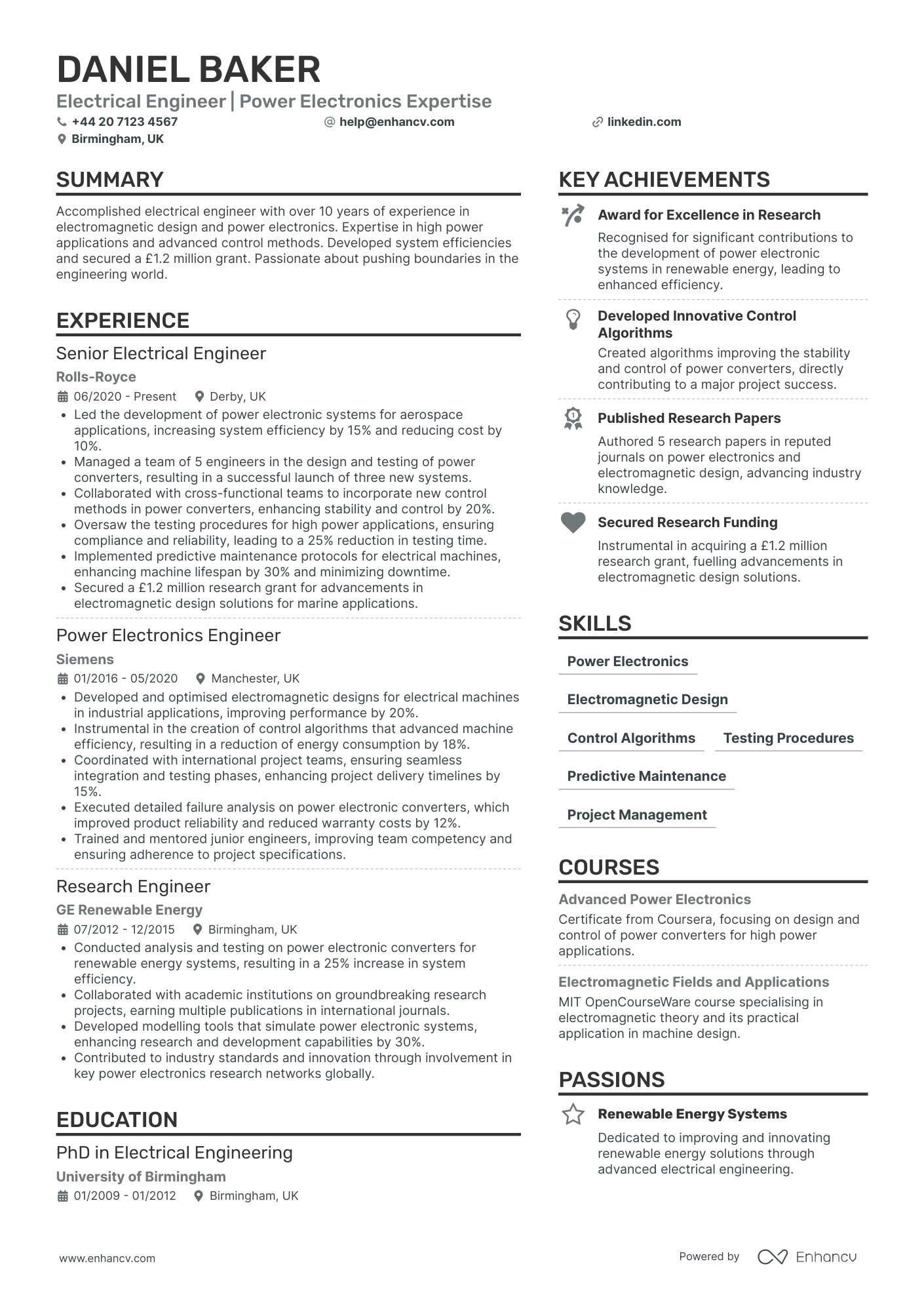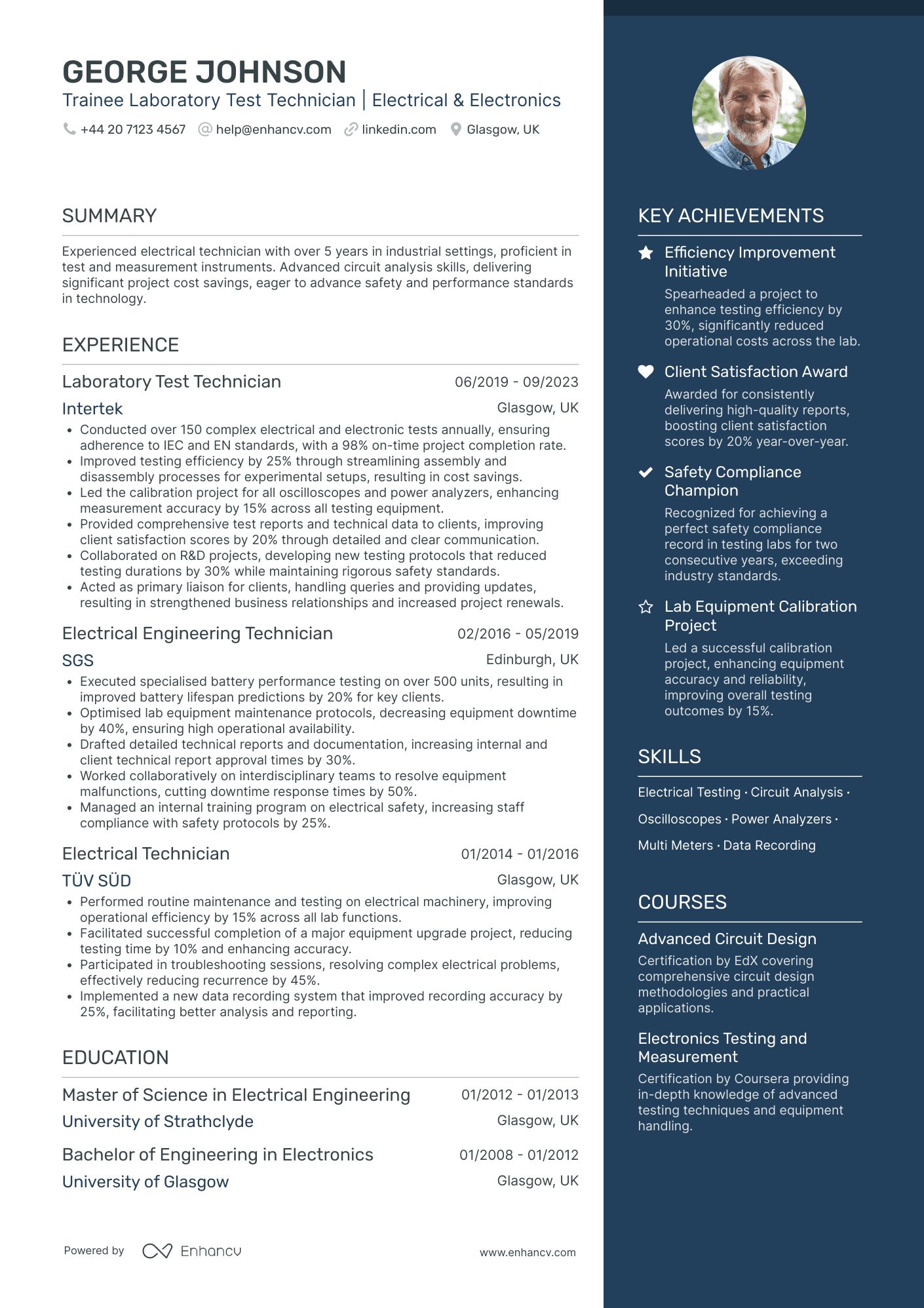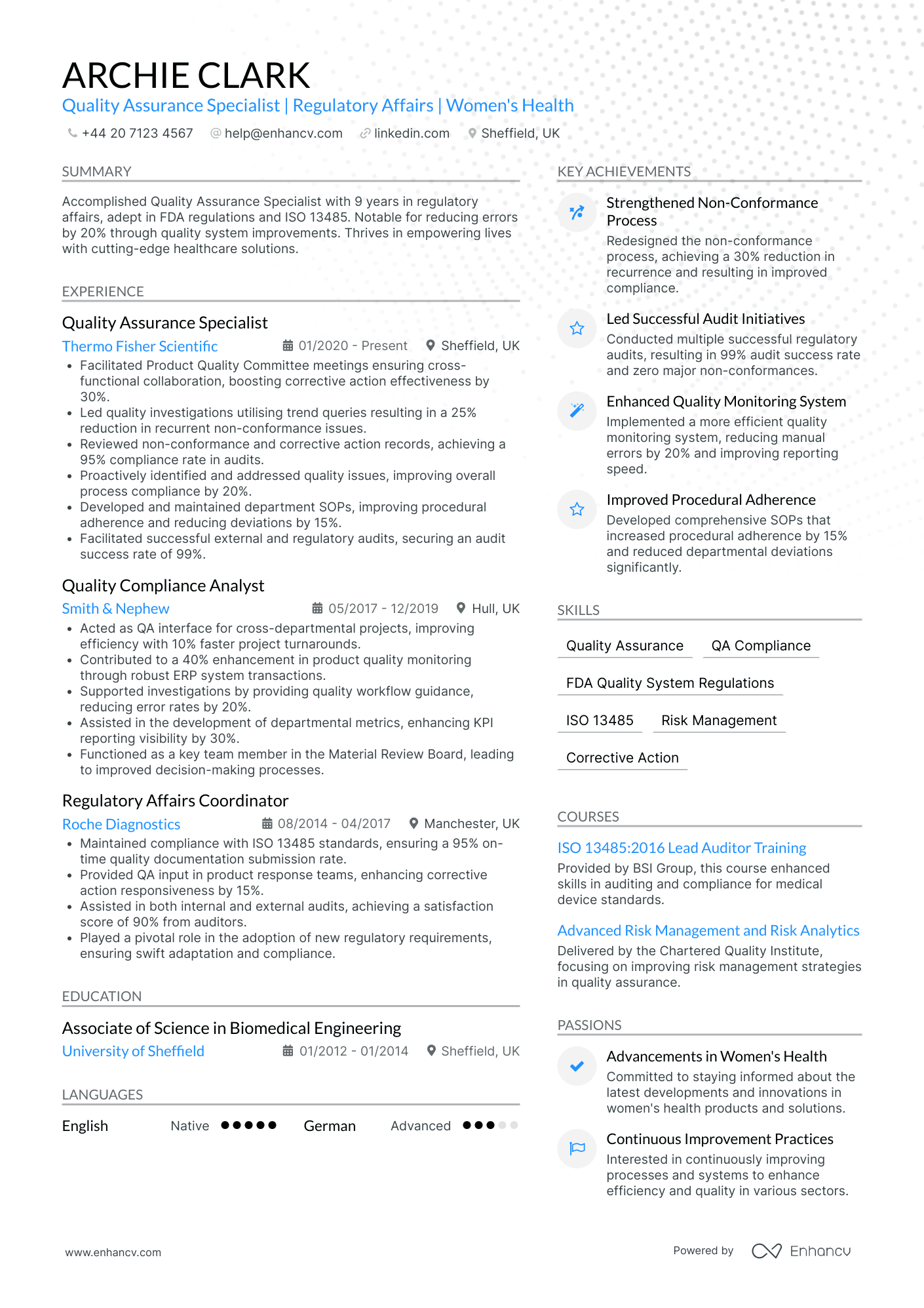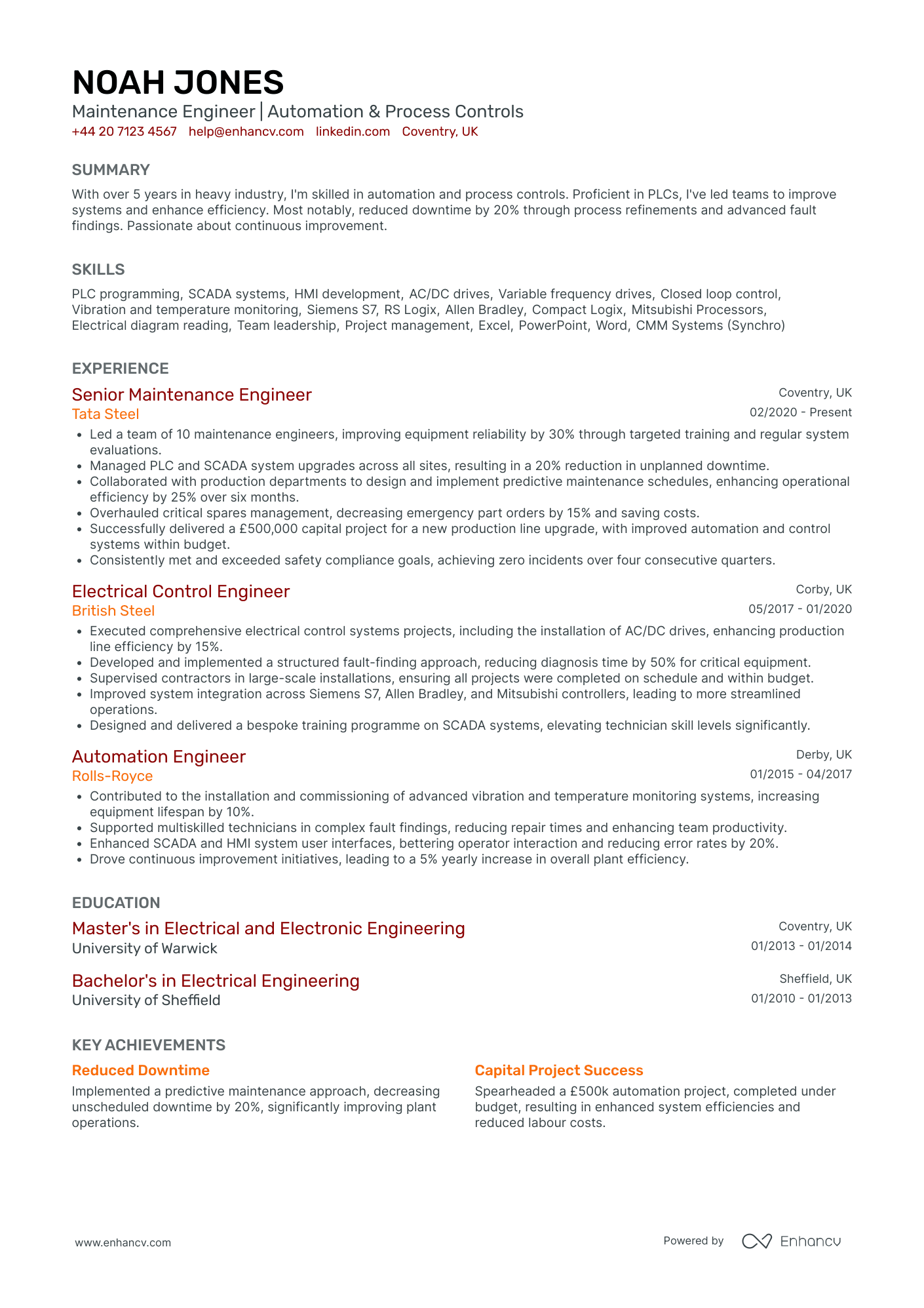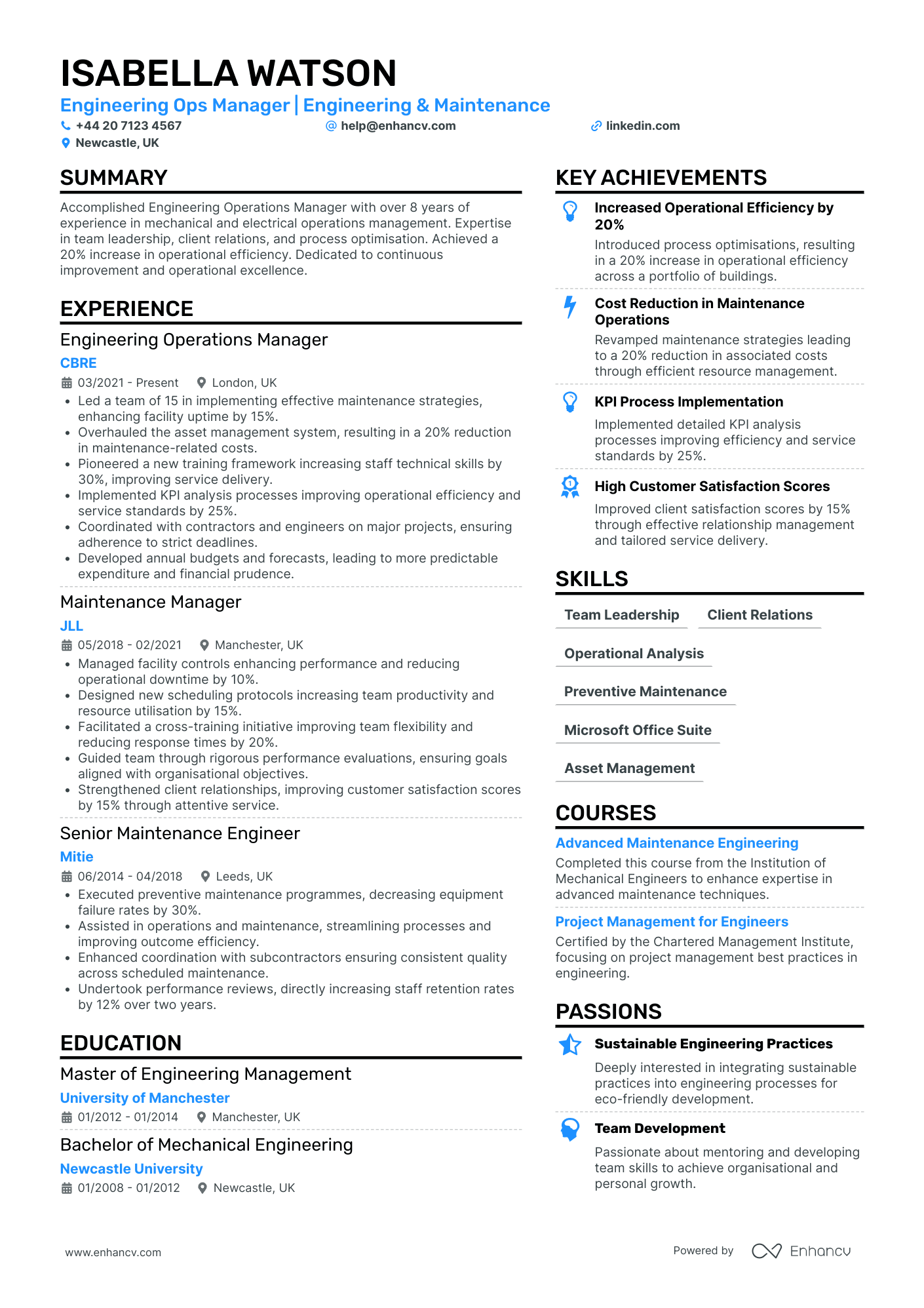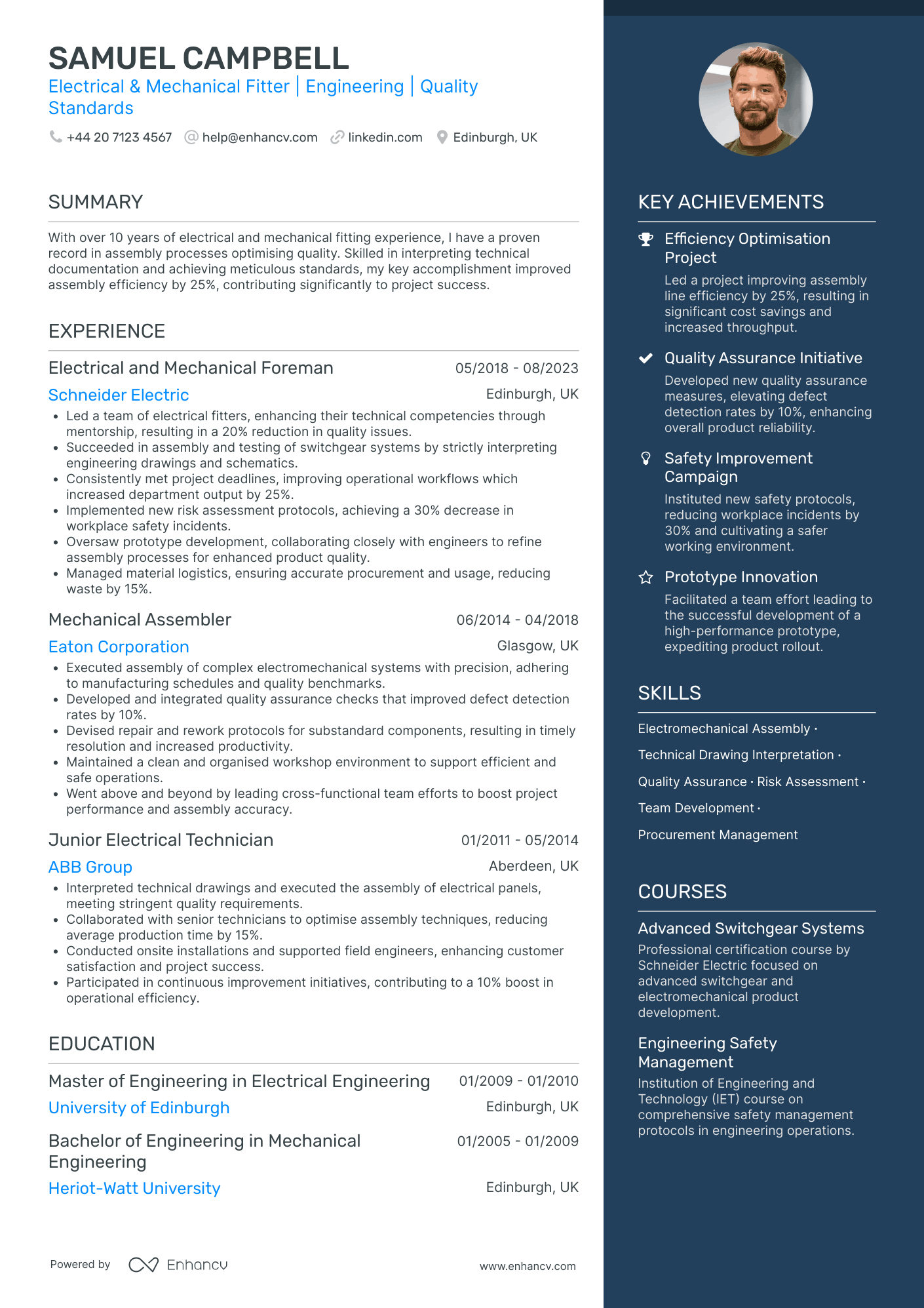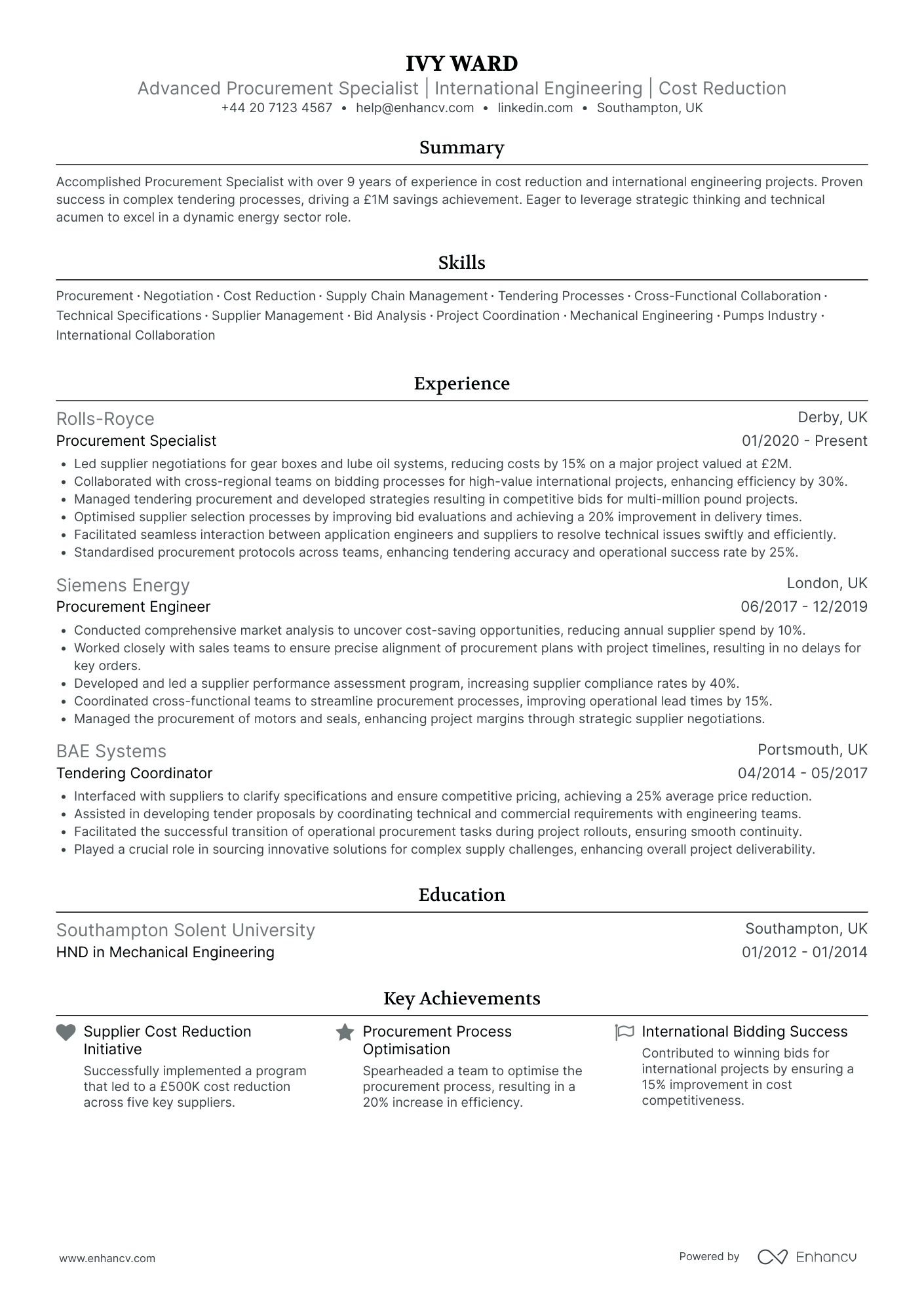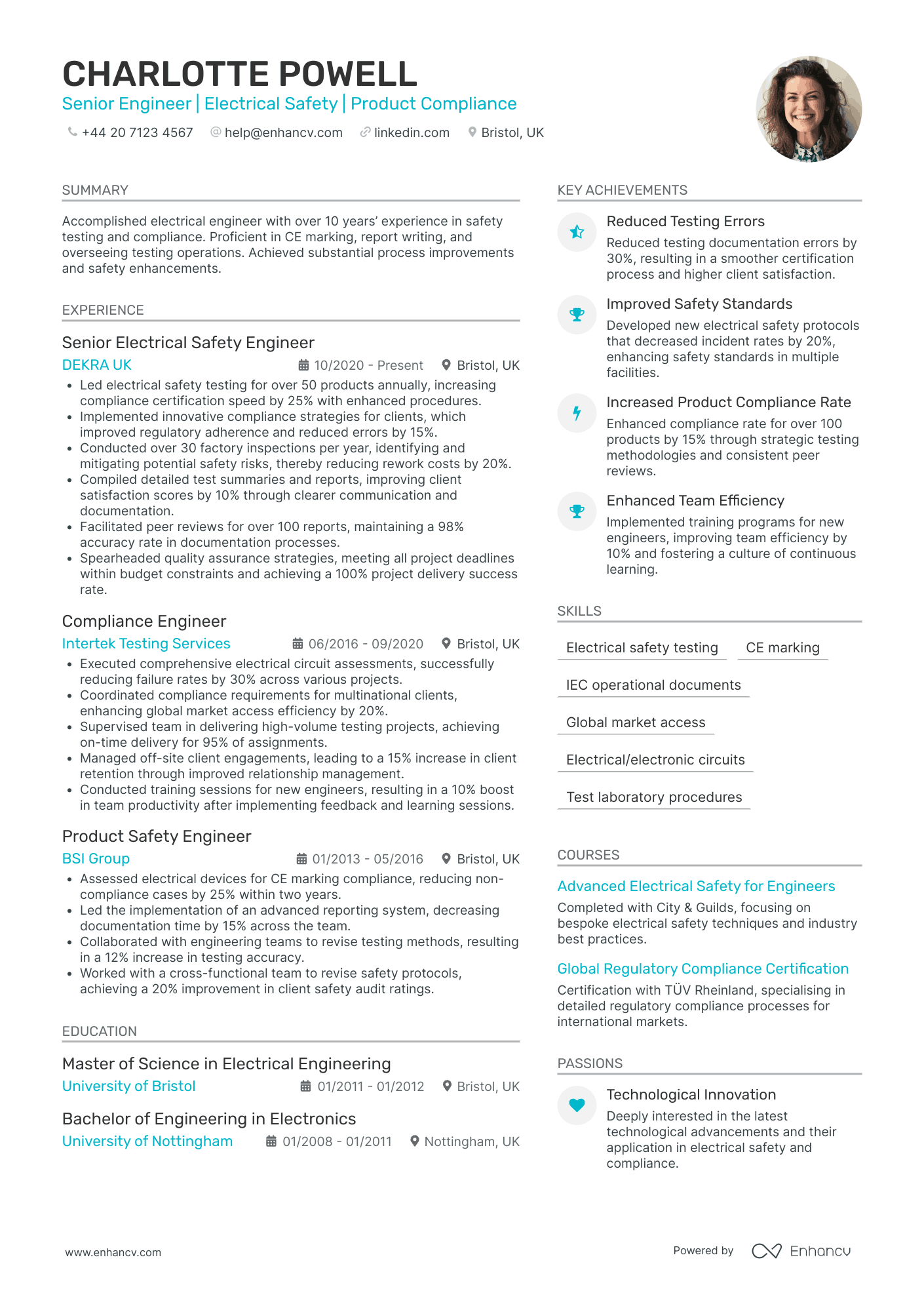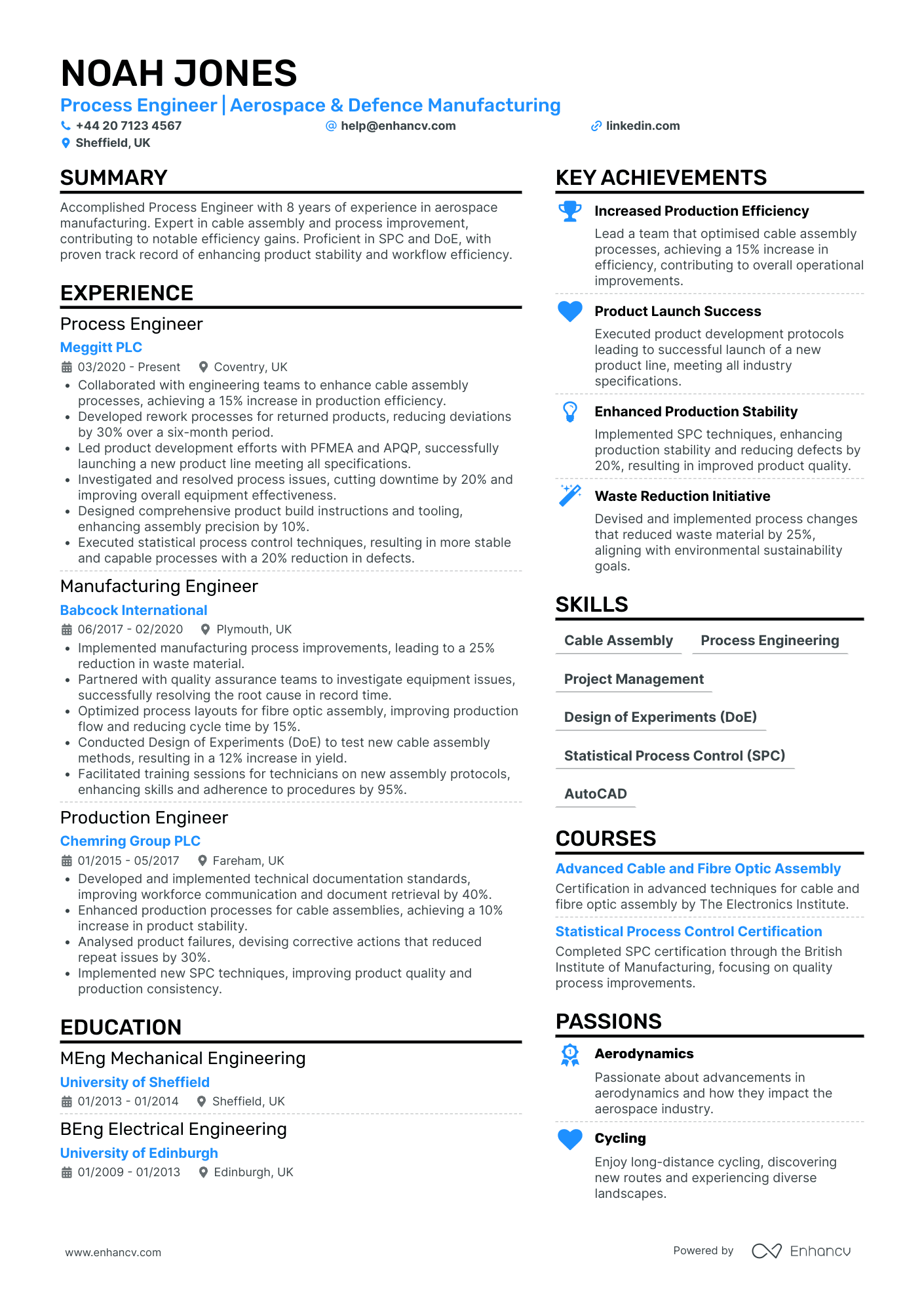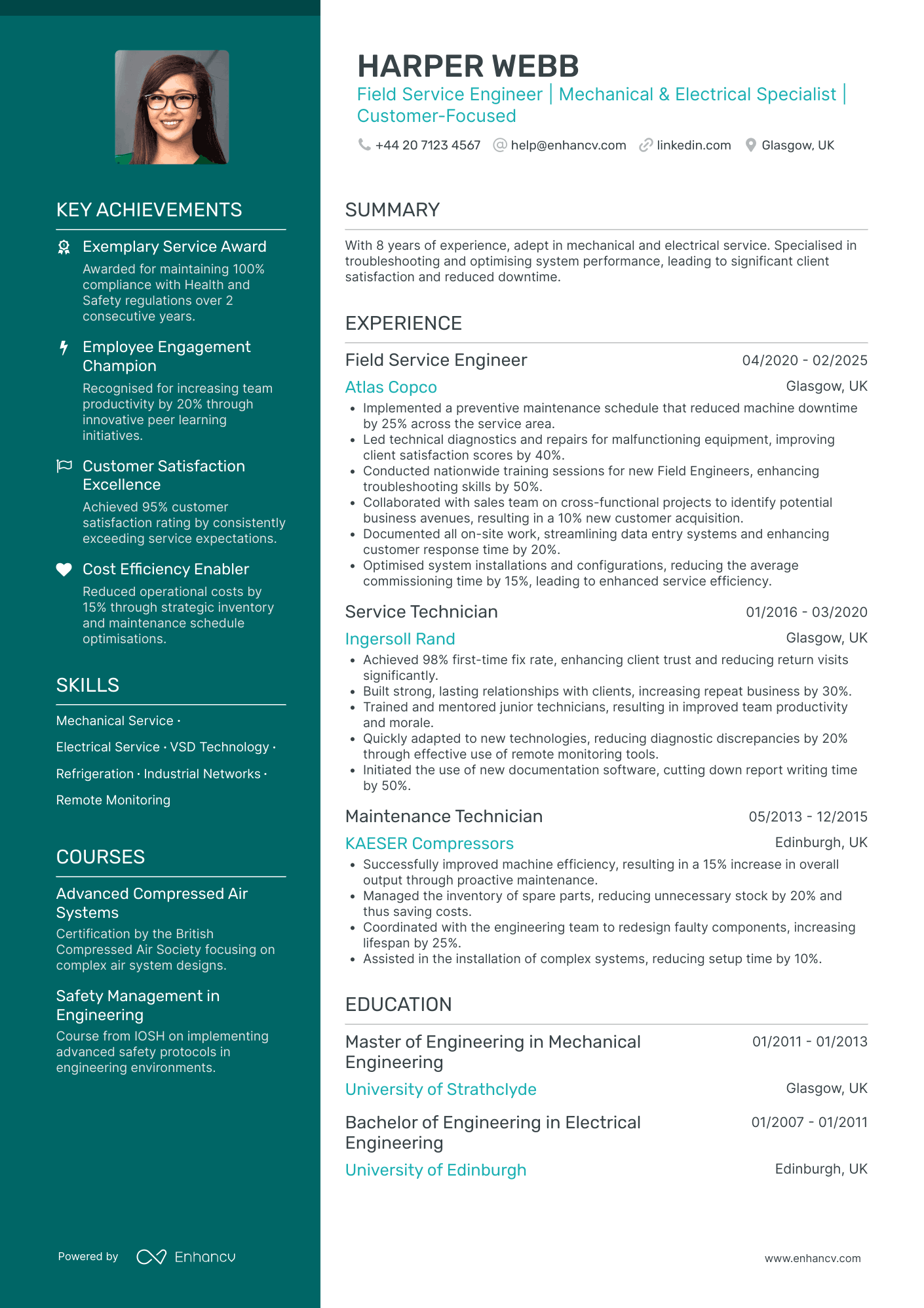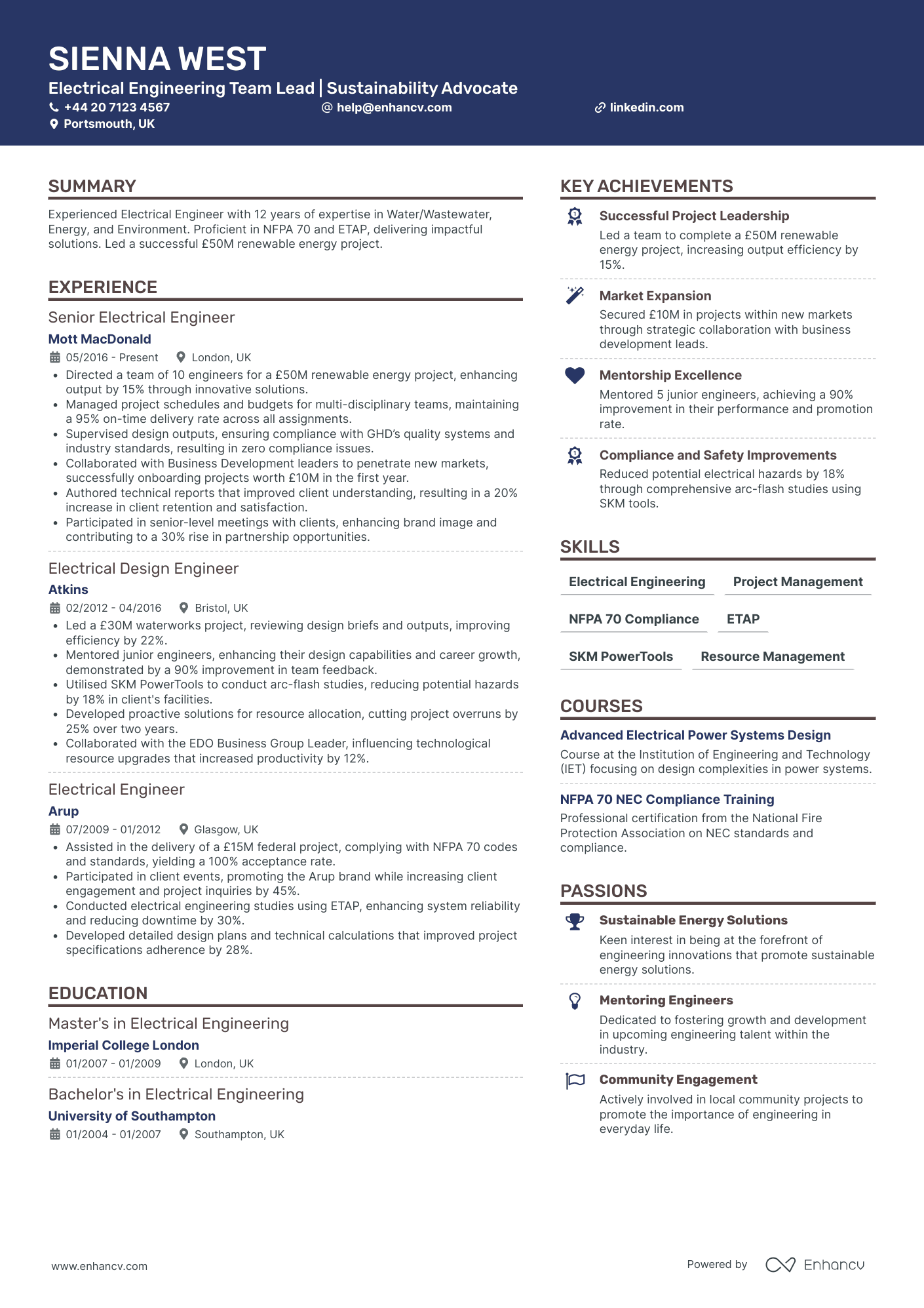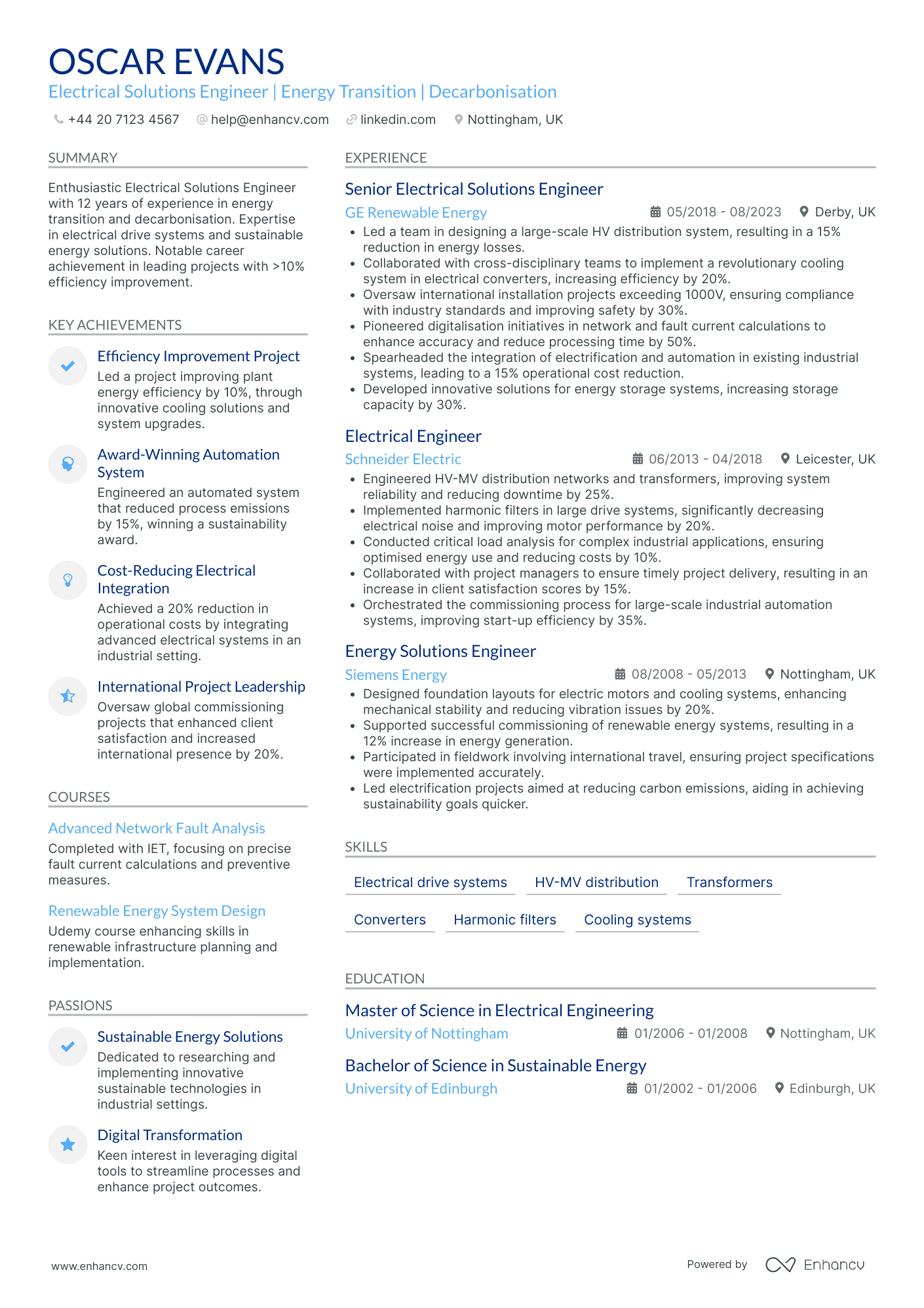Navigating the complexities of creating a concise CV that effectively showcases your technical expertise is a common challenge in electrical engineering. Our guide offers tailored advice and practical examples to help you highlight your skills and achievements, ensuring your CV stands out to potential employers.
- Design and format your professional electrical engineering CV;
- Curate your key contact information, skills, and achievements throughout your CV sections;
- Ensure your profile stays competitive by studying other industry-leading electrical engineering CVs;
- Create a great CV even if you happen to have less professional experience, or switching fields.
When writing your electrical engineering CV, you may need plenty of insights from hiring managers. We have prepared industry-leading advice in the form of our relevant CV guides.
Resume examples for electrical engineering
By Experience
Junior Electrical Engineering Consultant
- Career Growth through Strategic Contributions - Joshua's CV showcases a clear upward trajectory within the recruitment industry, highlighted by his transition from an intern to a consultant. His swift promotions and the responsibilities he assumed, such as leading projects and securing major accounts, reflect both personal ambition and professional capability, underscoring his rapid development in just a few years.
- Innovative Application of Recruitment Tools and Techniques - The CV highlights Joshua's proficiency with CRM systems and his ability to leverage technical recruiting techniques to improve processes and outcomes. His certification in advanced recruiting techniques and ability to implement a new CRM system underscore his commitment to technical excellence and innovation within the recruitment domain.
- Quantifiable Impact and Value Creation - The CV effectively details Joshua's impact on business growth through various achievements. For instance, he secured a key account that boosted company revenue by 30%, and his leadership in reducing hire time while maintaining candidate satisfaction demonstrates his capability to deliver both immediate and long-term business value.
Senior Electrical Engineering Analyst
- Structured Career Progression - Thomas Walker's CV effectively outlines his growth from a Junior Electrical Engineer at National Grid to a Senior Electrical Engineer at EDF Renewables. This clear career trajectory highlights his increasing responsibilities and expertise, particularly in the energy sector dealing with high-voltage designs.
- Impressive Achievements with Business Impact - The CV includes specific accomplishments that demonstrate significant business impact, such as completing a 275kV substation project under budget and reducing project delays. These achievements reflect his capability to deliver projects efficiently and contribute to organizational goals.
- Technical Proficiency and Specialization - With a focus on 275kV and 400kV substation designs, Thomas's CV showcases industry-specific technical depth through his experience with AutoCAD design and grid connection management. His expertise in fault level analysis and power system protection further enhances his profile as a specialized engineer in the energy field.
Principal Electrical Engineer
- Career Development and Progression - Lucas Adams' CV illustrates a clear path of career advancement within electrical engineering. Starting as an Electrical Engineer at AECOM, he moved steadily through the ranks to Senior Electrical Engineer, eventually achieving the title of Principal Electrical Engineer at Arup. This progression showcases not only his expertise but also his ability to take on increasing levels of responsibility and leadership over the years.
- Leadership and Mentorship Abilities - The document highlights Lucas Adams' commitment to leadership through his roles in guiding junior engineers and leading cross-disciplinary teams. His mentorship is credited with improving project delivery times by 20%, demonstrating his ability to enhance productivity and foster team growth, which is crucial for his role as a Principal Electrical Engineer.
- Technical Expertise and Innovative Solutions - A distinctive aspect of Lucas Adams’ profile is his emphasis on sustainable and innovative design solutions. His role in achieving a 40% reduction in energy consumption for an urban development project demonstrates his ability to employ cutting-edge technologies and methodologies like Building Information Modelling (BIM) and sustainable design principles, which are critical in modern electrical engineering.
Graduate Electrical Engineer
- Structured and Concise Presentation - The CV is well-organized, making it easy to navigate through each section. It concisely presents Ava Phillips' qualifications, experience, and skills, ensuring that key information is quickly accessible to potential employers. This clarity reflects an ability to communicate effectively and prioritize essential details.
- Impressive Career Progression - Ava's career trajectory demonstrates significant growth, moving from a Building Services Technician to an Electrical Design Engineer at a reputed company like AECOM. This upward movement reflects professional development and an increasing level of responsibility and expertise in building services engineering.
- Depth in Industry-Specific Tools and Techniques - The CV highlights Ava’s proficiency with industry-standard tools such as Revit, AutoCAD, and BIM, showcasing technical depth. Through continuous learning, as evidenced by courses like 'Advanced Revit Techniques,' Ava ensures up-to-date skills that are highly relevant in electrical design and building services.
Entry-Level Electrical Engineer
- Clear and Structured Presentation - The CV excels in clarity and structure, with sections logically arranged to showcase key areas such as experience, education, and skills. Each section is concise, using bullet points to highlight achievements, making it easy for readers to quickly grasp essential information.
- Consistent Career Growth - Jacob Roberts demonstrates a clear career trajectory, with consistent promotions and growing responsibilities. Starting from an Electrical Engineer at Rockwell Automation and moving up to an Electrical Design Engineer at Siemens, his career progression reflects his growing expertise and leadership capabilities in the field of electrical engineering.
- Specialized Technical Expertise - A standout element of this CV is its emphasis on industry-specific tools and methodologies, such as proficiency in AutoCAD and EPlan. Jacob’s expertise in designing and implementing automation systems and safety protocols is underscored by his ability to increase system efficiencies and reliability, showcasing a deep technical understanding.
By Role
Electrical Engineering Technician
- Clear Career Progression - Alice's CV illustrates a smooth and upward career trajectory, marked by significant progress from an Electrical Maintenance Technician to a Senior Maintenance Technician. This progression highlights her growing expertise and increasing responsibilities over time, demonstrating her capability to take on more complex roles within the rail and transportation industry.
- Industry-Specific Technical Proficiencies - The CV effectively showcases Alice's deep technical knowledge in industry-specific areas such as AC/DC motor systems, computer-based diagnostics, and electronic circuit fault-finding. These skills are crucial for her role in maintaining the reliability and efficiency of rail systems, underscoring her ability to navigate and address the intricate challenges of the rail industry.
- Proven Impact through Achievements - The document effectively quantifies Alice's contributions, such as enhancing fleet reliability by 30% and reducing recurring system failures by 20%. These metrics not only underscore her technical acumen but also highlight her strategic approach to problem-solving and her ability to implement changes that lead to substantial business improvements.
Electrical Engineering Project Manager
- Concise presentation and structured layout - The CV is well-organized, presenting information clearly and concisely. It effectively uses bullet points to highlight key achievements and responsibilities, making the content easy to skim and understand. The clean structure ensures that important details, such as project management skills and safety compliance expertise, are easily accessible, reflecting the candidate's thoughtful approach to communication.
- Impressive career progression with industry relevance - The career trajectory displays a strong upward movement from Junior Electrical Engineer to Senior Project Manager, indicating significant professional growth. Each role builds on the last, demonstrating a deepening expertise in electrical engineering and project management within the renewable energy sector. This progression highlights the candidate's ability to take on increasing responsibilities and adjust to the demands of higher-level roles.
- Distinctive technical prowess and methodological awareness - The CV emphasizes the candidate's deep technical understanding, including proficiency in managing complex electricity distribution projects and implementing safety protocols in line with CDM regulations. Their technical depth is further supported by industry-specific tools like MS Office and practical methodologies that contribute to optimized network operations, indicating a strong alignment with industry standards.
Electrical Engineering Systems Designer
- Structured career growth with leadership roles - Freya's career trajectory is marked by significant growth, transitioning from an Electrical Engineer at UK Power Networks to a Senior Electrical Design Engineer at Siemens Mobility. This progression highlights her ability to take on increasing responsibilities, lead major projects, and drive efficiency improvements, demonstrating her suitability for high-level engineering roles.
- Showcases advanced technical skills in HV Design - The CV emphasizes Freya's expertise in high-voltage (HV) design, power systems, and traction systems, which are crucial for her role in engineering. Her experience with power system simulations, AC/DC power design, and managing third rail system upgrades showcases her deep technical knowledge and industry-specific capabilities, positioning her as an expert in her field.
- Cross-functional collaboration and risk management - The document highlights Freya's adeptness at working with cross-functional teams and her proactive approach to risk management. Her ability to coordinate with diverse teams and conduct design risk assessments to mitigate engineering risks demonstrates adaptability and strong stakeholder communication skills, which are essential for project success and compliance.
Electrical Engineering Research Associate
- Structured clarity and focus - The CV's format is clean and well-organized, offering a concise presentation that navigates smoothly through the engineer's career narrative. Sections are clearly labeled, making it easy for hiring managers to quickly grasp key competencies, professional history, and achievements.
- Progressive career trajectory - Daniel Baker's career path shows significant growth from a Research Engineer to a Senior Electrical Engineer, indicating a strong upward trajectory in prestigious companies such as GE Renewable Energy and Rolls-Royce. This progression highlights both reliability and a capacity to assume increased responsibilities.
- Industry-specific technical depth - Demonstrating proficiency in specialized areas like power electronics and electromagnetic design, the CV captures industry-specific methodologies and tools. Notably, Baker’s ability to lead the development of power electronic systems for significant energy efficiency improvements and control advancements exemplifies deep technical expertise.
Electrical Engineering Lab Supervisor
- Comprehensive Career Progression - The CV demonstrates a clear and logical career trajectory, showing George Johnson’s growth from an Electrical Technician to a Laboratory Test Technician. This career path indicates both a deepening of expertise and a strategic focus on laboratory testing and client relations within the electrical and electronic sectors.
- Specialized Tools and Techniques - This document highlights George's proficiency with critical industry-specific tools like oscilloscopes and power analyzers, underscoring his technical depth. His contributions toward streamlining test processes and calibration projects further exhibit his ability to apply these skills effectively, ensuring high measurement accuracy and operational efficiency in testing environments.
- Impactful Achievements with Industry Relevance - Through quantifiable achievements such as improving testing efficiency by 25% and optimizing lab equipment maintenance protocols, George Johnson’s CV illustrates his direct impact on operational cost savings and productivity. These accomplishments not only highlight his problem-solving skills but also demonstrate his capacity to deliver significant business value and maintain high client satisfaction levels.
Electrical Engineering Quality Assurance Specialist
- Clarity and Structured Presentation - The CV is notably clear and well-structured, with each section clearly separated and easy to read. The use of concise bullet points allows for quick comprehension of the candidate’s extensive experience, while maintaining focus on the most relevant details for a Quality Assurance role.
- Defined Career Growth and Industry Focus - Archie's career trajectory displays a consistent advancement in quality assurance and regulatory affairs, with each role demonstrating increased responsibilities and impact. The steady progression from a Regulatory Affairs Coordinator to a Quality Assurance Specialist shows strong professional development within the life sciences industry, particularly within women's health, a steadily growing sector.
- Specialized Skills in Quality Assurance - The candidate possesses notable industry-specific expertise, such as proficiency with ISO 13485 and FDA Quality System Regulations. These skills, highlighted alongside specific tools and methodologies like ERP systems and non-conformance management, underscore Archie's technical depth and readiness to handle complex quality compliance challenges.
Electrical Engineering Maintenance Supervisor
- Clear and Structured Presentation - The CV is meticulously structured with clearly defined sections, making it easy to follow and ensuring that the most critical information stands out. Each section is concise, and the bulleted format under each job allows quick scanning and comprehension of Noah’s capabilities and achievements.
- Dynamic Career Trajectory - Noah Jones displays a clear career advancement through progressively senior roles in prominent companies like Tata Steel, British Steel, and Rolls-Royce. This progression demonstrates not only expertise but also consistent recognition and validation of skills in challenging and ever-evolving industrial environments.
- Impressive Industry-Specific Achievements - It highlights Noah's ability to deliver significant industrial results, including a 20% reduction in unplanned downtime and a successful £500,000 capital project. The relevance of these achievements is underscored by their direct impact on operational efficiencies and cost reductions, revealing Noah's strategic and impactful approach to automation and process controls.
Electrical Engineering Operations Manager
- Clarity and Structure - The CV is well-organized, with sections clearly labeled, allowing recruiters to quickly locate relevant information. It efficiently uses bullet points for achievements and responsibilities, making it easy to digest key aspects of the candidate's experience.
- Career Trajectory and Progression - Isabella Watson's career shows a consistent upward trajectory, progressing from a Senior Maintenance Engineer to a leadership role as Engineering Operations Manager. This progression underscores her capability to excel and take on greater responsibilities within the engineering field.
- Technical Proficiency and Methodologies - The CV indicates proficiency in sophisticated asset management systems, preventive maintenance processes, and the use of KPI analysis to enhance operational efficiencies—demonstrating her deep technical understanding and application of advanced engineering methodologies.
Electrical Engineering Production Supervisor
- Effective Presentation of Career Progression - Samuel Campbell's CV clearly highlights a strong career trajectory with well-defined roles at respected companies such as Schneider Electric and Eaton Corporation. The progression from a Junior Electrical Technician to an Electrical and Mechanical Foreman at Schneider Electric demonstrates substantial professional growth and increased responsibility over a 12-year period. This trajectory suggests solid career development and an accumulation of expertise over time.
- Diverse Industry-Specific Skills - The CV effectively showcases a rich assortment of industry-specific skills, reflecting Samuel Campbell’s diverse technical capabilities. Skills like Electromechanical Assembly, Technical Drawing Interpretation, and Prototype Development indicate deep technical knowledge and a strong foundation in electrical and mechanical engineering practices. These competencies are crucial for someone in the electrical and mechanical fitter roles, making him a valuable asset to the engineering field.
- Leadership and Mentorship - Samuel's role as an Electrical and Mechanical Foreman involved leading a team of electrical fitters, which highlights his capacity for leadership and mentorship. His ability to enhance technical competencies and achieve a 20% reduction in quality issues underscores his effective leadership style and commitment to team development. This aspect of his experience demonstrates not only technical prowess but also the soft skills essential for fostering a productive work environment.
Electrical Engineering Procurement Specialist
- Strong structure and clear presentation - The CV is well-organized, making it easy to follow. Each section is clearly defined, providing a concise overview of the candidate's experience, qualifications, and achievements. The use of bullet points in the experience section helps convey information succinctly and highlights key accomplishments.
- Demonstrates growth through various roles - Ivy Ward's career trajectory is marked by steady progression through significant positions in major companies. Starting as a Tendering Coordinator and advancing to a Procurement Specialist at renowned firms like BAE Systems, Siemens Energy, and Rolls-Royce evidences his advancement in responsibility and expertise in the procurement and engineering sectors.
- Impactful achievements with business relevance - The CV lists achievements that not only provide numerical outcomes but also underline their impact on business objectives. For example, achieving a 15% cost reduction on a £2M project and a £1M savings over two years demonstrates Ivy’s effectiveness in driving significant cost efficiencies, critical in the procurement landscape.
Electrical Engineering Safety Coordinator
- Demonstrates technical depth in electrical safety and compliance - Charlotte Powell's CV effectively showcases her expertise in the niche field of electrical safety and compliance. Her ability to lead safety testing for numerous products and to implement compliance strategies that improve both regulatory adherence and testing accuracy highlights her deep technical knowledge and aptitude for specialized industry challenges.
- Exceptional career progression within the electrical engineering field - The career trajectory presented in the CV traces a clear path from her beginnings as a Product Safety Engineer to her current senior role, reflecting significant professional growth. Her transition from roles that focused on CE marking and compliance coordination to a senior engineering position underscores her expanding responsibilities and leadership capabilities.
- Strong record of achievements with clear business impact - The CV is abundant with quantifiable achievements, such as increasing compliance certification speed by 25% and reducing testing documentation errors by 30%. These accomplishments are not just numbers; they signify an ability to facilitate process efficiencies that lead to substantial business improvements, like cost reduction and enhanced client satisfaction.
Electrical Engineering Process Engineer
- Clarity and Concise Presentation - The CV is structured to convey key information clearly and concisely. Each section is well-organized, with bullet points highlighting the most significant achievements, ensuring that the reader can quickly grasp the candidate's qualifications and experience.
- Diverse Career Trajectory - Noah's career trajectory shows steady growth in the aerospace and defense sectors, from a Production Engineer to a Process Engineer. This progression indicates a deepening of skills and responsibility, while maintaining a focus on process optimization within specific industry contexts.
- Deep Industry-Specific Expertise - The CV demonstrates Noah's extensive knowledge and usage of industry-specific tools and methodologies, such as Statistical Process Control (SPC) and Design of Experiments (DoE). This technical depth aligns well with the needs of aerospace and defense manufacturing processes.
Electrical Engineering Field Service Engineer
- Content Presentation: Clarity and Structure - The CV is organized with clear headers and sections, enhancing readability. Each section is distinct and concise, providing an easy-to-follow narrative of experience and achievements. The summary is succinct yet informative, giving readers immediate insight into Harper's qualifications.
- Career Trajectory: Growth and Recognition - Harper Webb's career progression is evident from the long tenure at progressively responsible positions. Starting as a Maintenance Technician and evolving into a Field Service Engineer, each role highlights increased responsibilities and impactful contributions, such as leading training sessions and cross-functional projects.
- Unique Industry-Specific Elements: Technical Depth - The CV showcases a strong command of industry-specific tools and methodologies like VSD Technology, Remote Monitoring, and Air Audits, which are critical in the mechanical and electrical service sectors. These technical proficiencies are further supported by specialized certifications and courses.
Electrical Engineering Technical Lead
- Clear and Concise Structure - The CV is well-structured and systematically organized, starting with personal details and moving through sections like summary, experience, education, and skills. This logical flow makes it easy for readers to navigate and quickly digest key information about Sienna West's professional capabilities.
- Consistent Career Growth - Sienna's career trajectory showcases a clear path of advancement, starting as an Electrical Engineer and advancing to Senior Electrical Engineer and Team Lead roles. This progression not only indicates a deepening of expertise but also highlights her ability to take on leadership responsibilities and manage complex projects within the engineering sector.
- Emphasis on Leadership and Mentoring - Throughout her roles, Sienna demonstrates significant leadership abilities, consistently leading teams and mentoring juniors. Such dedication to fostering growth in others is evident in the 90% improvement in her mentees' performance, illustrating a commitment to developing engineering talent and enhancing team dynamics.
Electrical Engineering Solutions Architect
- Comprehensive Career Progression - Oscar's career trajectory is clearly outlined, demonstrating progressive growth in seniority and responsibilities. His journey from an Energy Solutions Engineer at Siemens Energy to a Senior Electrical Solutions Engineer at GE Renewable Energy showcases his dedication and expertise in the field of energy transition and decarbonisation, marking continual advancement and leadership in prominent companies.
- Diverse Skillset with Industry-Specific Depth - The CV highlights a broad range of specialized skills pertinent to electrical engineering and energy solutions, such as electrical drive systems, HV-MV distribution, and energy storage solutions. This technical depth, supported by his significant achievements in reducing energy losses and enhancing system efficiencies, underscores his capability to address complex engineering challenges with precision.
- Impactful Achievements with Business Relevance - The document effectively links achievements to business outcomes by not only quantifying improvements but also demonstrating their direct relevance to business objectives. For instance, projects that led to energy loss reductions and operational cost efficiencies are not only technical successes but also strategic contributions that enhance competitive advantage and sustainability for his employers.
Structuring and formatting your electrical engineering CV for an excellent first impression
The experts' best advice regarding your CV format is to keep it simple and concise. Recruiters assessing your CV are foremost looking out for candidates who match their ideal job profile. Your white space, borders, and margins. You may still be wondering which format you need to export your CV in. We recommend using the PDF one, as, upon being uploaded, it never alters your information or CV design. Before we move on to the actual content of your electrical engineering CV, we'd like to remind you about the Applicant Tracker System (or the ATS). The ATS is a software that is sometimes used to initially assess your profile. Here's what you need to keep in mind about the ATS:
- All serif and sans-serif fonts (e.g. Rubik, Volkhov, Exo 2 etc.) are ATS-friendly;
- Many candidates invest in Arial and Times New Roman, so avoid these fonts if you want your application to stand out;
- Both single and double column CVs can be read by the ATS, so it's entirely up to you to select your CV design.
PRO TIP
Use bold or italics sparingly to draw attention to key points, such as job titles, company names, or significant achievements. Overusing these formatting options can dilute their impact.
The top sections on a electrical engineering CV
- Contact Information is crucial for communication.
- Educational Background showcases relevant qualifications.
- Technical Skills reflect specific electrical engineering expertise.
- Work Experience demonstrates practical industry involvement.
- Projects and Publications highlight tangible accomplishments.
What recruiters value on your CV:
- Highlight your technical proficiency by detailing your experience with specific electrical engineering software and hardware tools, such as PCB design software or PLC programming.
- Emphasise any specialised electrical engineering skills you have, such as power system analysis, circuit simulation, or hands-on experience with electrical installations.
- Showcase relevant projects you've contributed to or led, including your role, the technology used, and the impact or results of the project.
- Include any professional affiliations, such as membership with the Institution of Engineering and Technology (IET), which demonstrates your commitment to the field.
- Mention any continuous professional development (CPD) courses or additional certifications you've attained that are specific to electrical engineering, such as a Chartered Engineer (CEng) status or health and safety certifications relevant to electrical work.
Recommended reads:
Our checklist for the must-have information in your electrical engineering CV header
Right at the very top of your electrical engineering CV is where you'd find the header section or the space for your contact details, headline, and professional photo. Wondering how to present your the name of the city you live in and the country abbreviation as your address;
- are tailored to the role you're applying for by integrating key job skills and requirements;
- showcase what your unique value is, most often in the form of your most noteworthy accomplishment;
- select your relevant qualifications, skills, or current role to pass the Applicant Tracker System (ATS) assessment. Still not sure how to write your CV headline? Our examples below showcase best practices on creating effective headlines:
Examples of good CV headlines for electrical engineering:
- Lead Electrical Design Engineer | Renewable Energy Systems | Chartered PE | 10+ Years
- Senior Power Systems Analyst | HV & LV Networks | IET Member | MSc Electrical Engineering | 12 Years
- Electrical Project Manager | Infrastructure Development | PRINCE2® Certified | Risk Management | 8 Years Experience
- Junior Electronics Engineer | Embedded Systems Design | BEng Hons | Prototyping & Testing | 2 Years
- Principal Signal Processing Specialist | Telecoms & Satellites | PhD | MATLAB Expert | 15+ Years
- Automation & Control Systems Expert | Industrial Robotics | Lean Six Sigma | MEng | 10 Years
Opting between a electrical engineering CV summary or objective
Within the top one third of your electrical engineering CV, you have the opportunity to briefly summarise your best achievements or present your professional goals and dreams. Those two functions are met by either the CV summary or the objective.
- The summary is three-to-five sentences long and should narrate your best successes, while answering key requirements for the role. Select up to three skills which you can feature in your summary. Always aim to present what the actual outcomes were of using your particular skill set. The summary is an excellent choice for more experienced professionals.
- The objective is more focused on showcasing your unique value as a candidate and defining your dreams and ambitions. Think about highlighting how this current opportunity would answer your career vision. Also, about how you could help your potential employers grow. The objective matches the needs of less experienced candidates, who need to prove their skill set and, in particular, their soft skills.
Still not sure about how to write your CV opening statement? Use some best industry examples as inspiration:
CV summaries for a electrical engineering job:
- With over 7 years of experience in electrical engineering, I have honed skills in circuit design and project management, backed by a strong track record of developing energy-efficient electrical systems for industrial clients, including a notable retrofit project that saved a manufacturing plant 20% in energy costs annually.
- Specialising in power systems, my 5-year tenure at a leading energy firm involved overseeing the successful integration of renewable energy sources into existing power grids, reducing reliance on non-renewable resources by 30% and spearheading innovative energy solution projects across Europe.
- Transitioning from a successful 8-year career as a mechanical engineer, I am eager to apply my robust analytical and design skills to electrical engineering, particularly in renewable energy systems, and contribute my experience in complex problem-solving and CAD design from previous groundbreaking aerospace projects.
- Moving into electrical engineering from a 6-year background in software development, where I excelled in creating efficient code for automation systems, I look forward to employing this expertise in embedded systems to streamline and enhance the performance of electrical hardware for smart grid applications.
- Eager to embark on a career in electrical engineering, my fresh perspective, coupled with a recent First-Class Honours degree in Electrical Engineering from the University of Warwick, will bring a keen enthusiasm for cutting-edge smart energy solutions and a commitment to rigorous quality assurance testing and innovation.
- As a graduate with extensive theoretical knowledge from Imperial College London in electronic circuits and systems, I am ready to apply my rigorous academic training and passion for renewable energy technologies to an entry-level role in electrical engineering, aiming to contribute to eco-friendly and sustainable power solutions.
Best practices for writing your electrical engineering CV experience section
If your profile matches the job requirements, the CV experience is the section which recruiters will spend the most time studying. Within your experience bullets, include not merely your career history, but, rather, your skills and outcomes from each individual role. Your best experience section should promote your profile by:
- including specific details and hard numbers as proof of your past success;
- listing your experience in the functional-based or hybrid format (by focusing on the skills), if you happen to have less professional, relevant expertise;
- showcasing your growth by organising your roles, starting with the latest and (hopefully) most senior one;
- staring off each experience bullet with a verb, following up with skills that match the job description, and the outcomes of your responsibility.
Add keywords from the job advert in your experience section, like the professional CV examples:
Best practices for your CV's work experience section
- Developed a new PCB design for a consumer electronic device, improving product efficiency by 15% and reducing production costs by 10%.
- Authored technical reports and documentation to support the maintenance and installation of electrical systems, ensuring compliance with industry standards.
- Led a team of five engineers in the development of a solar-powered charging station, which is now deployed in over 100 locations nationwide.
- Engineered power distribution systems for commercial buildings, integrating sustainable energy solutions and achieving a 20% reduction in energy consumption.
- Implemented advanced automation and control systems for manufacturing clients, resulting in a 25% increase in production output and heightened error detection accuracy.
- Regularly collaborated with cross-functional teams, including mechanical engineers and software developers, to refine system integration processes.
- Managed electrical component sourcing for multiple projects, establishing strong relationships with suppliers and negotiating contracts that saved the company an average of 5% on materials.
- Conducted comprehensive failure analysis and troubleshooting on high-voltage equipment, enhancing system reliability and extending equipment lifetime by 30%.
- Stayed abreast of emerging trends and technologies in the electrical engineering field, applying this knowledge to innovate designs and propel the company's technical capabilities forward.
- Initiated and led the development of an energy-efficient power distribution system for large commercial buildings, achieving a 20% reduction in energy consumption over two years.
- Collaborated closely with cross-disciplinary teams to integrate smart grid technologies into existing infrastructures, enhancing system reliability and scalability for a client portfolio including Fortune 500 companies.
- Mentored a team of junior electrical engineers, overseeing their progress on projects and ensuring continued professional development within the company.
- Performed in-depth analysis and troubleshooting of electrical systems in industrial machinery, increasing machine uptime by 35% and reducing maintenance costs by 25%.
- Coordinated with project managers to implement custom control system solutions that fulfilled unique client specifications while adhering to strict budget constraints.
- Enhanced team efficiency by introducing a structured project documentation process, substantially reducing the time taken to onboard new engineers.
- Designed and executed the electrical layout for a new solar power plant, contributing to an increase in renewable energy output by 40% in the region.
- Conducted rigorous safety protocols and quality assurance checks on all electrical equipment, sustaining an impeccable safety record with zero incidents during the tenure.
- Streamlined the procurement process for electrical components, negotiating with suppliers to secure a cost reduction of 15% while maintaining quality standards.
- Engineered novel energy storage systems for consumer electronics, seeing through the product lifecycle from conception to successful market launch.
- Played a key role in securing a lucrative contract through the technical presentation of a custom power supply design tailored to the client's needs, leading to a 10% company revenue increase.
- Identified bottlenecks in the RF testing process and implemented a new procedure that accelerated the quality assurance phase by 50%.
- Pioneered a patented circuit protection technique that was later adopted across multiple product lines, improving product longevity and customer satisfaction.
- Liaised with software engineers to develop and introduce a proprietary diagnostic tool that reduced on-site repair times by 30%.
- Instituted a comprehensive training program for new hires on company-specific electrical engineering practices, elevating team competence and reducing reliance on external consultants.
- Directed the electrical design of a groundbreaking electric vehicle, garnering industry awards for innovation and pushing the company to the forefront of automotive technology.
- Implemented cutting-edge power conversion techniques that boosted battery efficiency by 20%, substantially outperforming industry benchmarks.
- Optimized supplier engagement processes which enhanced the component sourcing workflow, resulting in a 10% reduction in project lead times without compromising quality.
- Orchestrated the installation of electrical systems in multinational data centers, meeting stringent deadlines and contributing to a 99.99% uptime record for hosted services.
- Developed and integrated custom power monitoring solutions that allowed data center clients to track energy usage and optimize their power management strategies.
- Boosted departmental productivity by implementing a peer review cycle, fostering collaboration and knowledge-sharing among the electrical engineering team.
- Assisted in the design of a power line communication system that enabled the introduction of smart meters in residential areas, contributing to enhanced energy management and a reduced carbon footprint.
- Regularly interfaced with clients to refine project specifications and ensure alignment with their strategic energy goals, reinforcing strong client relationships and repeat business.
- Drove innovation by submitting multiple proposals for process optimization, one of which resulted in the adoption of a new hierarchical project management approach that shortened project timelines by an average of 15%.
Writing your CV without professional experience for your first job or when switching industries
There comes a day, when applying for a job, you happen to have no relevant experience, whatsoever. Yet, you're keen on putting your name in the hat. What should you do? Candidates who part-time experience , internships, and volunteer work.
Recommended reads:
PRO TIP
Include examples of how you adapted to new tools, environments, or work cultures, showing your flexibility.
The CV skills' divide: between hard and soft skills
Of course, you may have read the job requirements plenty of times now, but it's key to note that there is a difference between technical and personal skills. Both are equally relevant to your job application. When writing about your skill set, ensure you've copy-pasted the precise skill from the job requirement. This would not only help you ensure you have the correct spelling, but also pass any Applicant Tracker System (ATS) assessments.
- Hard skills show your technological capabilities. Or whether you'll be a good technical fit to the organisation. Ensure you've spotlighted your hard skills in various sections of your CV (e.g. skills section, projects, experience) by including the technology and what you've attained;
- Soft skills pinpoint your personality and people or communication skills, hinting at if you'll easily accomodate into the team or organisation. Quantify your soft skills in your CV achievements, strengths, summary/objective, and experience sections. Always support your soft skills with how they've helped you grow as a professional.
Top skills for your electrical engineering CV:
Circuit analysis
Electrical design and simulation
Power systems knowledge
PCB layout and design
Control systems engineering
Digital signal processing
Proficiency with electrical CAD software
Microcontroller programming and embedded systems
Knowledge of industry standards and regulations
Troubleshooting and diagnostic techniques
Problem-solving
Attention to detail
Teamwork and collaboration
Effective communication
Project management
Time management
Adaptability
Critical thinking
Creativity
Continuous learning
PRO TIP
If there's a noticeable gap in your skillset for the role you're applying for, mention any steps you're taking to acquire these skills, such as online courses or self-study.
Further professional qualifications for your electrical engineering CV: education and certificates
As you're nearing the end of your electrical engineering CV, you may wonder what else will be relevant to the role. Recruiters are keen on understanding your academic background, as it teaches you an array of hard and soft skills. Create a dedicated education section that lists your:
- applicable higher education diplomas or ones that are at a postgraduate level;
- diploma, followed up with your higher education institution and start-graduation dates;
- extracurricular activities and honours, only if you deem that recruiters will find them impressive.
Follow a similar logic when presenting your certificates. Always select ones that will support your niche expertise and hint at what it's like to work with you. Balance both technical certification with soft skills courses to answer job requirements and company values. Wondering what the most sought out certificates are for the industry? Look no further:
PRO TIP
Order your skills based on the relevance to the role you're applying for, ensuring the most pertinent skills catch the employer's attention first.
Recommended reads:
Key takeaways
What matters most in your electrical engineering CV-writing process is for you to create a personalised application. One that matches the role and also showcases your unique qualities and talents.
- Use the format to supplement the actual content, to stand out, and to ensure your CV experience is easy to comprehend and follows a logic;
- Invest time in building a succinct CV top one third. One that includes a header (with your contact details and headline), a summary or an objective statement (select the one that best fits your experience), and - potentially - a dedicated skills section or achievements (to fit both hard skills and soft skills requirements);
- Prioritise your most relevant (and senior) experience closer to the top of your CV. Always ensure you're following the "power verb, skill, and achievement" format for your bullets;
- Integrate both your technical and communication background across different sections of your CV to meet the job requirements;
- List your relevant education and certificates to fill in gaps in your CV history and prove to recrutiers you have relevant technical know-how.
